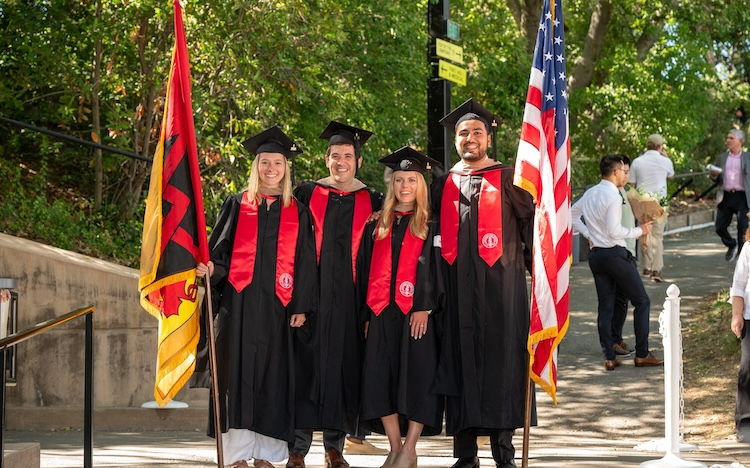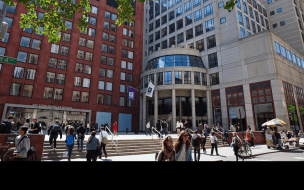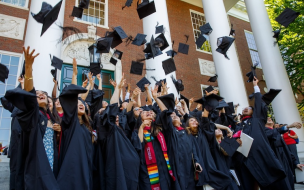There is a lot of work that goes into applying to a top MBA. You have to have a stellar GPA and record, a strong GMAT score, years of work experiences, and pertinent extracurricular activities. And, even when you have jumped all these hurdles you are still battling it out against the best candidates in the world.
Applying to the world’s best business schools is competitive. You’ll need to make sure that the combination of your GMAT score, GPA, and MBA resume make you stand out among the sheer quantity of candidates applying.
The Princeton Review lists the 10 US business schools with stringent application criteria, featuring some of the best known and most respected business schools around the country.
The list is based on school-reported data, a combination of GMAT and GRE scores, undergraduate GPAs of the first year class, and the percentage of candidates accepted and enrolled.
Here are the 10 hardest business schools to get into in 2024, according to the Princeton Review:
10 Hardest Business Schools To Get Into In 2024
Stanford, Harvard & MIT Sloan top the list
That Stanford leads the list for the toughest business schools to get into is no surprise.
In April 2024, US News reported that just 8.4% of applicants are accepted to the MBA program at Stanford Graduate School of Business.
According to the Princeton report, Harvard was a little more lenient with an acceptance rate of 11% and Columbia, the fourth hardest to get into, accepted 17% of applicants, double the Stanford rate.
Wharton, the world's best MBA according to the Financial Times, came in fifth for toughest to get into, Duke Fuqua was sixth, UC Berkeley in California came in seventh.
At the bottom end of the top 10 list are Chicago Booth, NYU Stern, and finally, with an acceptance rate of 33%, Northwestern Kellogg.
Unsurprisingly all the magnificent seven (M7) business schools feature in Princeton's list of toughest business schools to get into.
Applications to top-tier US business schools are, inevitably, highly competitive. Ivy League schools are renowned worldwide, and the prestige they bestow on their graduates is well-merited. An Ivy League MBA takes some earning.
So, does this mean you shouldn’t even bother applying to an elite business school? Not at all.
The 2024 application landscape
Candidates to these programs will be pleased to hear that in the past few years, since 2021, the business education application cycles have become less competitive, especially at top tier business schools.
According to the Graduate Management Admission Council’s (GMAC), 2023 Application Trends Survey the most selective programs received fewer applications while moderately selective and flexible programs reported growth.
Across all degree programs in 2023 there was a 5% drop in the absolute total of applications. This is the second year in a row in which total applications decreased after a small pandemic-related boost in 2020 that was maintained through 2021.
The outcome of the upcoming US election may further impact application to US business schools. International applications to US business schools dwindled under the last previous Trump administration, however he recently promised to switch policy and allow graduates of US colleges access to green cards.
While Kamala Harris's intentions about foreign students haven't been made clear yet, during the Biden-Harris administration there have been significant changes to visa regulations, particularly the H1B visa, which is the most popular route to employment in the US for international students.
This includes a streamlined process, increased visa numbers, eligibility requirements and greater flexibility for F-1 visa holders, but also a weighty extension fee.
If the drop in international b-school applications trend continues into the upcoming cycle, it does mean a more positive application landscape for domestic US students looking to land a spot at one of these elite universities.
How to get into top US business schools
Applying to a top school is not a number’s game. There are other factors to consider which may work in your favor as explains David White, admissions consultant and founding partner of Menlo Coaching:
"Data shows that the average GMAT scores for accepted students at Stanford, Harvard or MIT Sloan equate to 675+ on the GMAT exam, but test scores alone are not sufficient. MBA programs also judge other qualities, including your professional experience, extracurricular activities, previous academic record, and fit with their program.
"Top US business schools are not looking to produce students with high grades, but exceptional alumni. They’re looking for people with the potential to do great things -- and ones who will generously help their classmates and fellow alumni to succeed, too," says David.
A history of solid achievements will weigh in your favor, he adds: "You should have clear career goals and indicate to the admissions committee how you will be able to realize them with the help of their MBA. These career goals should be ambitious, but also possible. On the other hand, your extracurricular activities and your conduct at work, as captured in your recommendation letters, can reassure the program that you'll help others succeed."
David explains that some applicants who are already in highly compensated jobs that they love may decide to apply to only a few schools, and simply skip the MBA if they don't get in. "For other applicants, who cannot achieve their goals without an MBA, the most reasonable strategy is to apply to a mix of reach, target and safety schools, including one or two programs where their grades and test scores exceed the school's averages for admitted students," he advises.
RECAPTHA :
f0
25
d5
0b









